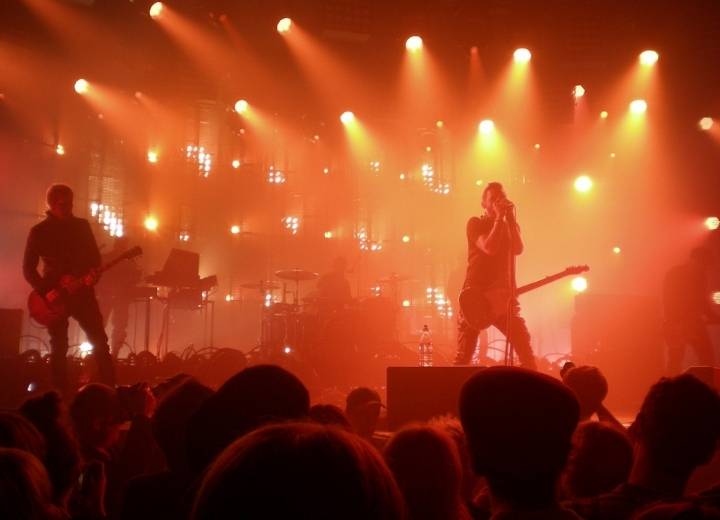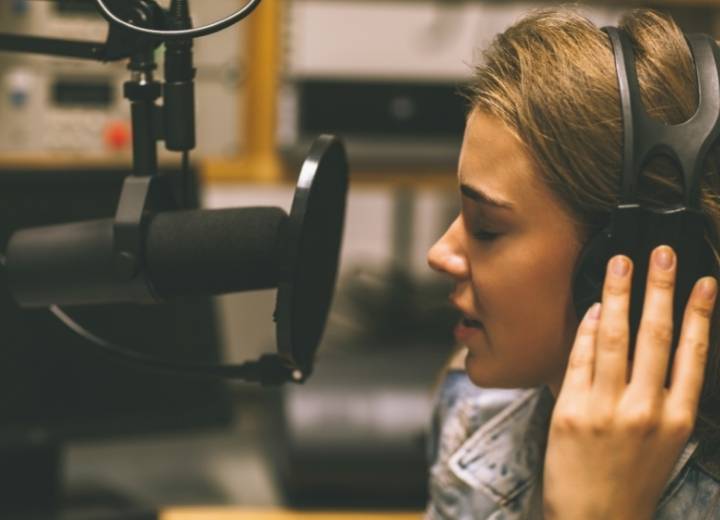
As an artist, you may be comfortable standing on stage performing. But that doesn’t mean you’ll feel the same way in the recording studio and vice versa.
There are differences between these two forms that not every artist understands. Soon, we will analyze these factors in more detail.
Difference between studio recording vs live performance
Studio recording and live performance are two types of music production but still have some differences.
There are four key differences between these two musical approaches. It’s the difference in goals, pacing, details, and preparations.
#1. Target
Live shows have many different goals. For example, to entertain a crowd or inspire an audience. Or the plan could be to perform music with noises to create a more vibrant atmosphere.
Unlike the live show, in the recording studio, the artist only has one main purpose. It’s a perfect recording with high quality.
Maybe you’re used to standing on stage performing. Or you already have a lot of experience to rock the crowd with your performance. However, when moving to the recording studio, you need to focus more.
Because the habits when performing live on stage will make you lose focus. Thereby hindering accuracy and reducing working efficiency.
Therefore, it may take you a while to get rid of the habit after months of playing live music.
#2. Tempo
A live show gives the artist an instant experience. That means the artist has a chance to go on stage.
At the same time, they perform their work in front of many people’s attention. There may be problems with the weather, equipment, but they still have to continue serving.
However, it is different for activities in the recording studio. If the music quality is not good enough, the faulty instrument manufacturer will step in to repair it. This work helps the artist to solve most of the recording defects.
Therefore, to have a perfect recording needs to be added, edited, interrupted, played back, etc.
So if you want to work in the most effective studio, it takes a lot of time and skill. A complete piece of music can take hours or even more.
#3. Details and quality
Audiences don’t go to a rock concert to see the perfect piece or notice every high note. In fact, most of the audience accepts some minor errors. Because this will bring a more realistic and vivid feeling.
As for the recording studio, it’s a different matter. Listeners demand attention to every detail of the recording. Small mistakes often don’t matter on stage.
But from the point of view of the recording studio, they were suddenly amplified and emphasized. Even small “microscopic” errors degrade the quality of the recording.

The tonal quality of trap drums, slight timing differences in jazz percussion tracks, or each note’s clarity when playing a guitar solo. When you perform live, these details seem to be overwhelmed by the noise.
But the re-created recording is different. The studio is the condition that helps the artist capture the subtlety of each moment.
#4. Preparation
Live gigs always require the artist to be fully rehearsed. For the most part, recording sessions take place with little or no preparation.
Prepare for the live performance:
- Remember, this is where the performers show all their skills and experience. Therefore, artists not only have to practice their performances but also need to sharpen their ability to perform on stage.
- This includes interaction with the audience. And it depends on the genre you choose. It could be anything from your words to your emotions, body language, and facial expressions on stage. In addition, the costumes also show the unique style and personality of the artist. So you should also make sure it matches your stage style.
- How to make your show attractive? And how do you make the audience feel like they’re part of the show? If you can work this out, you’ve got a perfect performance.
Preparing for recording in the studio:
- The goal here is to have the highest quality recording possible.
- To reach your goal, first practice your miking techniques. And if possible, you should try to record at home. This way helps you get used to singing when wearing headphones and restricting movement.
- Then you need to invest some money in production. Finally, think about how you want your song to be? What do you want to convey? Should you add harmonies? You must know every detail to give the best recording.
Frequently Asked Questions
- Why do people prefer live performance?
Many people prefer live performances because they feel like they are one with the artist. And they are part of the live performance.
The live performance brings a more vivid and realistic space than ever before. In addition, viewers can see live performances of their favorite artists.
- Why do studio recordings sound better?
For studio recordings, all employees need to work diligently to bring out the most perfect recording.
Minor errors that can be overlooked in a live performance cannot appear in the complete recording.
So the problem of equipment or noise, the manufacturer will fix it all. Since then, a quality recording of sound, syllables, …
- How to prepare for both studio recording and live performance?
As mentioned above, the preparations for the two types of music production are quite different. However, a talented artist can perform well both live and recorded.
To do that, they first need to practice their vocals carefully. Because vocals are the key to the success of the performance.
Plus, you’ll always be more productive in a relaxed state. So sleep a lot, provide adequate water and nutrition for the body.
Conclusion
Studio recording vs live performance has a lot of differences. However, if you are a talented artist, you can easily adapt to both of these performance environments.
Depending on the purpose of use and your preferences, you can choose one of the 2. Of course, you can completely choose both and always replace them for the highest recording efficiency.
